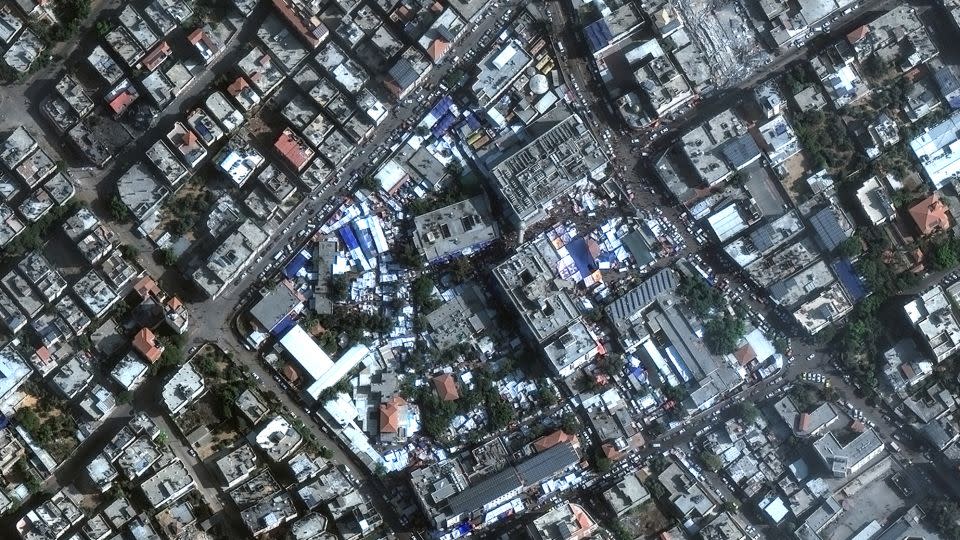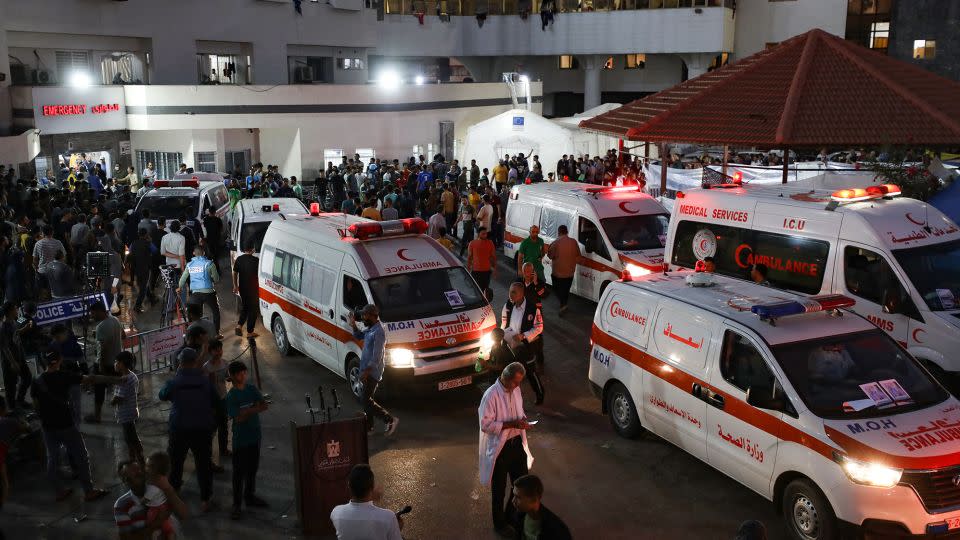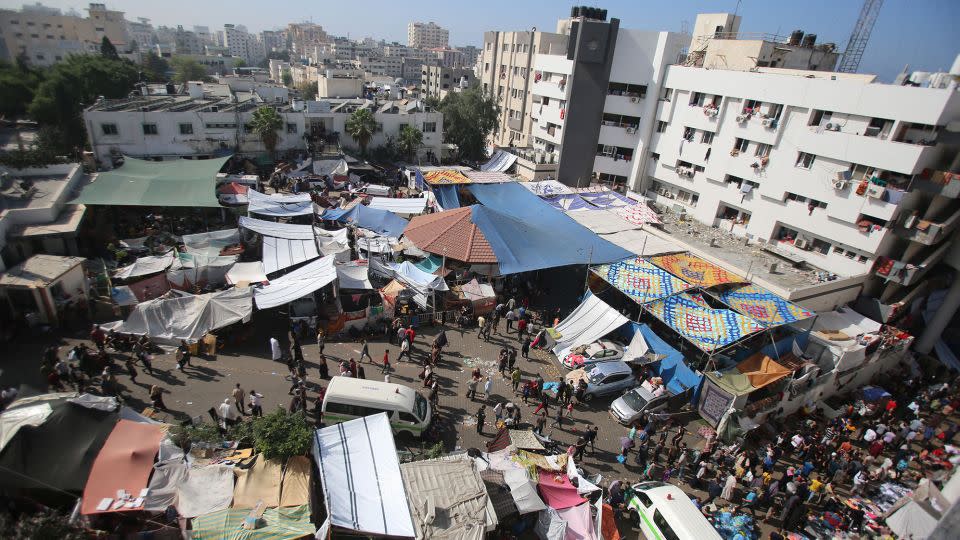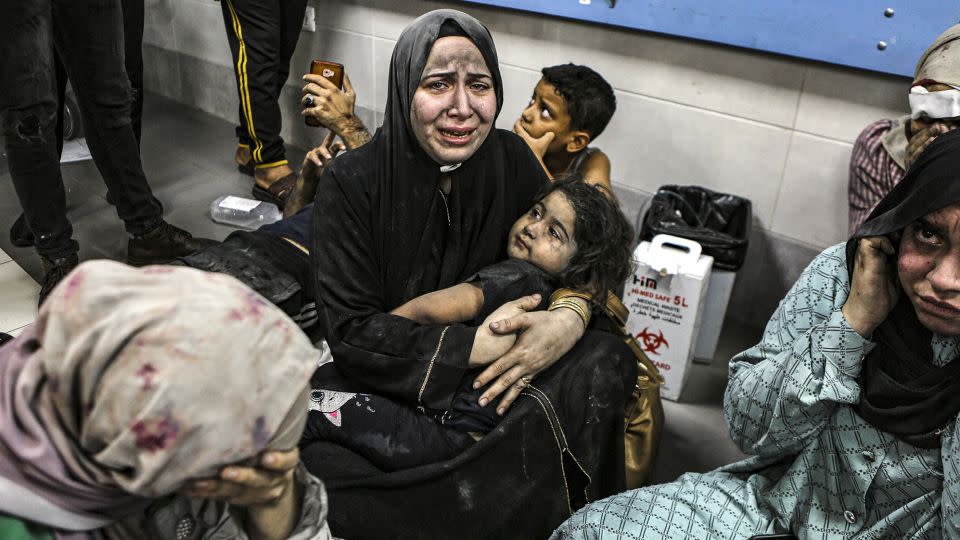Why Gaza’s largest hospital has become the ‘epicenter’ of Israel’s war on Hamas
Editor’s Note: A version of this story appears in CNN’s Meanwhile in the Middle East newsletter, a three-times-a-week look inside the region’s biggest stories. Sign up here.
Israeli forces launched a raid Wednesday on Gaza’s largest hospital, Al-Shifa, after accusing Hamas of operating from tunnels beneath the vast complex – a claim denied by the militant group and hospital officials.
Thousands of Palestinians are believed to be sheltering in and around the hospital, which the UN said had become the “epicenter” of fighting in the area, trapping vulnerable patients, staff and displaced Palestinians as they run out of medical supplies and fuel.
The hospital’s main building has effectively ceased functioning, with doctors working by candlelight and wrapping premature babies in foil to keep them alive – with some warning the situation inside has become “catastrophic.”
The hospital had become a microcosm of the wider war and the rhetoric around it. Palestinians hold up the fighting around Al-Shifa as proof of Israel’s wanton disregard for civilian life in Gaza, while Israel points to the hospital as an example of Hamas’ use of civilians as human shields.
But the decision by Israeli forces to enter the hospital marks a potential escalatory moment in the conflict which began on October 7, when Hamas militants entered Israel, killing more than 1,200 people and taking over 200 others hostage – the largest such attack on Israel since the country’s founding in 1948.
Retaliatory Israeli strikes have killed at least 11,470 people in Gaza, including 4,707 children, according to the Palestinian Ministry of Health in Ramallah, which draws figures from the Hamas-controlled territory.
Here’s what we know so far about Al-Shifa and the raid by the Israel Defense Forces (IDF).

What do we know about the IDF raid?
On early Wednesday morning local time, the IDF said it was “carrying out a precise and targeted operation against Hamas in a specified area in the Shifa Hospital” in Gaza.
CNN cannot independently verify Israel’s claims that Hamas is operating from the hospital.
Khaled Abu Samra, a doctor at the hospital, told CNN they were given 30 minutes’ warning before Israeli forces raided the complex.
“We were asked to stay clear of the windows and the balconies. We can hear the armored vehicles, they are very close to the entrance of the complex,” he said.
Khader Al Za’anoun, a journalist inside the hospital, told CNN on Wednesday morning Israeli tanks and military vehicles were in the hospital courtyard. He added Israeli soldiers were “in the buildings and departments are conducting search and interrogation operations with the young men amidst intense and violent gunfire inside the hospital,” and were using megaphones to ask young men in the hospital to “raise their hands, come out, and surrender themselves.”
Israel’s assault on Al-Shifa has compounded a dire humanitarian crisis inside the complex, Palestinian health officials say.
At least 41 patients, including three premature babies, lost their lives at Al-Shifa Hospital between November 11 and November 16 due to the lack of electricity, according to a report published by the Palestinian Authority’s Ministry of Health in Ramallah on Friday citing medical sources from the Hamas-controlled enclave.
Most of the ICU patients who relied on ventilators have died due to the lack oxygen and fuel to power the hospital generator, Dr. Ahmad Mofeed Al-Mokhalalati, the head of the burns department at Al-Shifa Hospital told Qatari TV channel Al-Jazeera over the phone from inside the hospital on Friday.
Israeli army spokesman Peter Lerner told CNN on Wednesday that the IDF had informed hospital administrators, patients and civilians inside to take cover “because we intend on conducting our military operation in order to differentiate and distinguish between the civilians and the terrorists.”
On Monday, doctors at Al-Shifa warned they refused an IDF evacuation order because they feared at least 700 patients would die if they were left behind.
Israel has repeatedly claimed Hamas is using the hospital complex for military purposes.

What is Israel claiming?
After launching the raid on Al-Shifa, Israel claimed soldiers had “technological assets, along with military and combat equipment used by Hamas” in a room in the hospital.
“In another department in the hospital, the soldiers located an operational command center and technological assets belonging to Hamas,” the statement said, claiming “the terrorist organization uses the hospital for terrorist purposes.”
Israel released video of a tunnel shaft in the grounds of Al-Shifa. In the footage, the shaft appears to be reinforced with concrete. Exposed pipes and cabling can also be seen close to the surface.
Hamas rejected Israel’s findings as “baseless lies.”
CNN cannot independent verify Israel or Hamas’ claims.
The bodies of two Israeli hostages – a 65-year-old woman and an Israeli soldier – were found near Al-Shifa hospital this week, Israel’s military said.
Volker Türk, the UN High Commissioner for Human Rights, called on Israel to grant his team access to Gaza to investigate competing claims about Al-Shifa Hospital.
“We need to look into this by having access. We cannot rely on one or the other party when it comes to this,” Volker Türk, the UN High Commissioner for Human Rights, told CNN’s Becky Anderson when asked about allegations by the Israeli military that Hamas was hiding weapons at the hospital.

He said the situation needs an “independent international investigation, because we have different narratives.”
“You cannot use civilian, especially hospitals, for any military purposes. But you also cannot attack a hospital in the absence of clear evidence,” Türk added.
How have Palestinians responded?
Hamas, Palestinian health officials and medical workers have also vehemently denied Israel’s claims about Al-Shifa, and condemned Wednesday’s raid.
The director general of the Gaza health ministry, Dr. Medhat Abbas, told CNN that Gaza’s hospitals “are used to treat patients only” and are not being used “to hide anyone.”
After the raid began, Palestinian Authority Health Minister Dr. Mai Al-Kaila said it represented “a new crime against humanity, medical staff, and patients,” and warned it could have “catastrophic consequences” for patients and medical staff.
In a statement Wednesday, Hamas blamed both Israel and the US for the raid, claiming that the US had given Israel “a green light … to commit more massacres against civilians” by using Israel’s “false narrative” of Al-Shifa being used as a command center.
The statement also accused the United Nations of failing to defend Palestinians.

What has the United States said?
The White House has backed Israel’s claims, saying Tuesday that Hamas was storing weapons and operating a command node from the al-Shifa hospital in Gaza, citing US intelligence.
“Hamas and the Palestinian Islamic Jihad, PIJ, members operate a command-and-control node from al-Shifa in Gaza City. They have stored weapons there and they are prepared to respond to an Israeli military operation against that facility,” John Kirby, a US National Security Council spokesman, told reporters traveling with President Joe Biden. Kirby presented no evidence to back up his statement.
White House officials have declined multiple times to expand on how they can back Israel’s claims, as the US does not have troops on the ground in Gaza.
But Biden also said Monday that hospitals in Gaza “must be protected” and that his “hope and expectation is that there will be less intrusive action” around them.
Why is Al-Shifa so important?
The sprawling medical facility of Al-Shifa, which sits in the western part of Gaza City, was built in 1946 when Gaza was still under British rule. It has long been seen as the backbone of medical services across the besieged Gaza Strip, and has been hit in previous Hamas-Israel conflicts.
As early as Israel’s first war with Hamas in 2008-2009 – almost a year after the militant group seized control of the enclave – Israel had been claiming that Hamas fighters were sheltering in mosques, hospitals and other civilian places to avoid Israeli attacks.
Former Minister of Internal Security and Shin Bet director, Avi Dichter, said in in 2009 that it was “an open secret” among Palestinians living in Gaza that Hamas uses Al-Shifa for its operations, a claim that Hamas repeatedly denied.
The hospital was struck nine years ago during the 2014 Israel-Gaza war, which was strongly condemned by aid and medical organizations. Palestinians blamed the 2014 attack on Israel, while Israel said it was the result of a failed rocket launch by Hamas.
The hospital made headlines a year later, when human rights group Amnesty International published a damning report on Hamas, including allegations that Hamas militants interrogated and tortured people at a clinic in Al-Shifa.
What does international law say about targeting hospitals?
International humanitarian law (IHL) governs the way in which warfare is conducted and seeks to limit the suffering caused. It is designed to give protection to civilians and civilian objects, including medical staff and facilities.
But protection is not unconditional. “They can lose their protection if they are used outside of their humanitarian function to commit acts harmful to the enemy,” Cordula Droege, chief legal officer of the International Committee of the Red Cross, explained in a video Tuesday, adding that using buildings like hospitals to house combatants and weapons can turn civilian objects into legitimate military targets.
Once a hospital has lost its protected status, an attack could be permissible – but the attacking party must give warning before launching a strike. “The purpose of such a warning is to allow those who misuse the hospital to stop the acts harmful to the enemy, or, if they persist, to allow for the safe evacuation of patients and medical staff,” Droege said, noting that this is not always feasible in conflict situations.
The IDF said in a statement on Wednesday that it had warned for weeks that Hamas’s “continued military use of the Shifa hospital jeopardizes its protected status.” The statement added that the IDF had also notified the relevant authorities on Tuesday that all military activities within the hospital must stop within 12 hours.
But this “does not mean there is free license to attack,” said Droege. All strikes are governed by the “principle of proportionality,” which states the attacking party has to ensure the expected harm caused to civilians will not be “excessive” in relation to the expected military advantage. All parties must also take precautions to minimize civilian harm.
But determining proportionality is a fraught task. Michael Schmiit, a law professor at the University of Reading and former targeting officer in the US Air Force, told CNN making such a calculation is “the hardest decision a commander can make on the battlefield, because there’s no bright-line test.”
CNN’s Tamar Michaelis, Jo Shelley, Abeer Salman, Andrew Carey, Kareem Khadder, Celine Alkhaldi, Manveena Suri, Aimee Look, Eyad Kourdi, Becky Anderson, Jennifer Deaton, Haley Britzky and Kevin Liptak contributed to this report
For more CNN news and newsletters create an account at CNN.com

